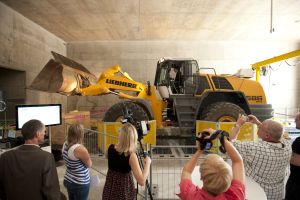Construction machines, municipal vehicles, agricultural and forestry machines perform heavy work. Tasks and operations that frequently are located off the road represent particular challenges on driving technology and control concepts. They are in the focus of research conducted by the Endowed Chair for Mobile Work Machines of the Institute of Vehicle System Technology (FAST) at KIT. For this purpose, the scientists use a modern, four-wheel acoustic roller dynamometer.
Using the test bed designed for vehicles with a empty weight of up to 40 tons, the engineers among others study the power and functioning as well as external and internal noise of mobile work machines and commercial vehicles. At the same time, aspects of safety, energy efficiency, user friendliness, and cost reduction play an important role as for private cars. “Mobile work machines differ from private cars above all by their driving systems that are of variable importance depending on the application,” says Professor Markus Geimer, who holds the endowed chair at FAST. “In a combine harvester, for instance, 80 % of the engine power go into the harvesting process. Only about 20 % of the power are needed for driving. “Presently, the drive trains for driving and working are still separated in these vehicles. As energy may be recovered from both drive trains, their combination would be highly advantageous.
“With the test bed, we can now study the complete machines under close-to-reality conditions, but with reproducible loads,” says Geimer. Due to the possibility of comparing results, the latter is a major advantage over drives on a test area. Among others, the scientists investigate hybrid drives in mobile work machines. “We can study the power and efficiency of a backfitted wheel loader and we can simulate hybrid structures that are not yet integrated in a machine. This test bed allows to compare various concepts and systems in a scientifically sound manner,” emphasizes Geimer.
Investigations do not only focus on drive trains, but also on control concepts and in particular on self-adapting systems or systems capable of learning. “It is sometimes very difficult to predict the reactions of these systems,” says Geimer. “At the roller dynamometer, we can study such control systems in safety-critical situations without the operator being endangered.”
The test bed is equipped with four individually controllable rollers and, hence, can be applied for many tasks. They cover real tests to determine traction force data as well as experiments supported by simulations (vehicle-in-the-loop). Test speeds of up to 160 km/h and traction forces of up to 11 tons per wheel are possible. The test bed is used together with the FAST Chairs for Vehicle Technology (private cars and commercial vehicles), Railway System Technology, and Lightweight Construction.
The Mobility Systems Center pools KIT activities relating to vehicle technology. Presently, 40 KIT institutes with about 800 employees are working on methodological and technical fundamentals for tomorrow’s vehicles. It is their objective to develop energy-efficient, low-emission, and safe vehicles and mobility concepts. The researchers also consider the complex interactions of vehicle, driver, traffic, and society.
In close partnership with society, KIT develops solutions for urgent challenges – from climate change, energy transition and sustainable use of natural resources to artificial intelligence, sovereignty and an aging population. As The University in the Helmholtz Association, KIT unites scientific excellence from insight to application-driven research under one roof – and is thus in a unique position to drive this transformation. As a University of Excellence, KIT offers its more than 10,000 employees and 22,800 students outstanding opportunities to shape a sustainable and resilient future. KIT – Science for Impact.

